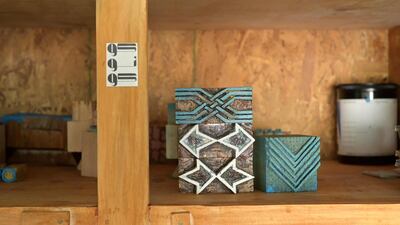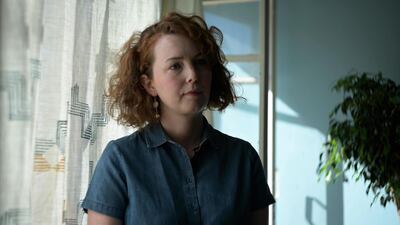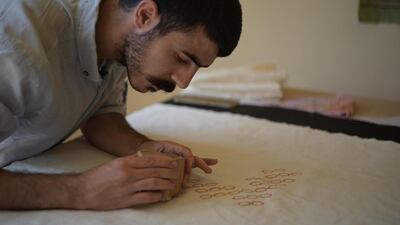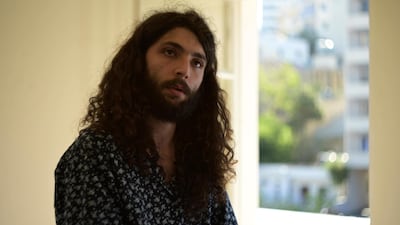Inside a rundown building at the heart of Beirut in Lebanon, young Syrian men are hard at work pounding a piece of white cloth with a hand-crafted stamp dipped in mahogany and deep brown.
They are among the last artisans to master the old Syrian craft of woodblock printing.
“When you come across a block-printed piece, there is something about it in your memory, you feel like you’ve seen it before,” says Ward AlKalaf, 26, a Syrian designer at the recently launched Studio Kunukku.
The project underlines Lebanon’s important role in preserving Syrian heritage, despite the country’s severe economic crisis and the deadly Beirut port explosion.

Many Syrian artists and artisans fled to Lebanon to escape war. Although Beirut is renowned for its vibrant arts scene, Studio Kunukku represents a rare new cultural enterprise at a time of crises.
AlKalaf says the workshop aims to revive these familiar patterns that are etched into Syria’s collective memory, but whose history has not been documented.
“We are trying to build a rescue plan for whatever remains of this craft,” he says.
Once popular across Syria, woodblock prints adorned homeware with intricate floral and animal shapes, as well as geometric motifs.
But 10 years of war and the advent of new technologies drove it to the brink of extinction.
Before arriving in Beirut to study fashion in 2017, AlKalaf, a Damascene, spent years collecting photographs of the traditional motifs adorning buildings in Aleppo, Hama, Homs and the Syrian capital.
These include intricate floral designs but also simple lines and curves that meet in perfect symmetry.
Most were destroyed by war. They are now serving as inspiration for the studio's stamps.
From Cairo to Beirut
The new studio was launched six months ago when Sarah Hayes, an American, quit her United Nations job in Cairo, to move to crisis-hit Beirut where she converted her apartment into a workshop for resuscitating endangered crafts.
Since then, a budding crew of Syrian, Ethiopian and Lebanese artisans have taken up residence at the volunteer-run atelier.
The British Council recently awarded the studio a grant, which the team hopes will be a launchpad for the project to become financially sustainable.
“There is room to find hope, we just have to create it,” Ms Hayes says as she peers out the window at the Mar Mikhael neighbourhood, badly damaged by the Beirut blast.

She came to Beirut in search of Zena Sabbagh, one of the last wardens of Syrian woodblock printing. Sabbagh dedicated her career to keeping woodstamping alive in Syria. After the war, she fled to Beirut where she taught other artisans the tenets of the craft, before moving abroad a few months ago.
'The choices are literally unlimited'
One of Sabbagh's students is Fadi Al Melhem, 25, the main artisan at Studio Kunukku and an old friend of AlKalaf's. A graduate of fine arts from Damascus University, he learnt everything he knows about the craft from Ms Sabbagh in Beirut and has now begun carving his own wooden stamps.
Marking a piece of cloth with a geometric shape of his own design, Al Melhem says his favourite motif is a simple straight line.

Dozens of wooden carvings lay beside him in the atelier, engraved with flowers, semi-circles and geometric shapes.
“The choices are literally unlimited,” he says, beaming with pride. "There are so many motifs to experiment with.”
Al Melhem's dream of becoming a jewellery designer was cut short last August when his prospective employer's shop was destroyed in the port explosion. But since then, he has found a new passion for block printing.
“Instead of expressing myself with words, I can express myself through a certain technique, an artwork,” he says.
Reviving the craft, however, requires a collective effort. The young man points at a large, ornate floral stamp that he carved drawing inspiration from a photograph that AlKalaf brought with him from Syria. The motif is from a Damascene house that no longer exists.
Their work, AlKalaf says, "is a tribute to all these beautiful places that have planted so many memories in my head".
Despite widespread corruption and economic strife in Lebanon, Al Melhem and AlKalaf say Beirut is a place where their dreams could come true.
"It's this fantasy that you're trying to do something of value and that, maybe, it will remain," says AlKalaf.
“I would have never imagined I could create something like this if I was still in Syria.”


